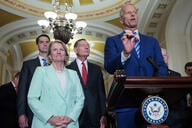You have /5 articles left.
Sign up for a free account or log in.

Tima Miroshnichenko/Pexels.com
The National Institutes of Health on Friday revised its early-stage investigator, or ESI, policy to allow those working on previously granted extensions to request more time as ESIs, due to COVID-19 or other “life events.”
Prior to the policy adjustment, many women said they’d been denied pandemic-related extension requests because they’d already been granted extensions due to childbirth. This raised questions about the NIH’s stated commitment to supporting women in science, specifically to women who run academic labs as principal investigators (PIs).
“There has been a lot of focus on early stage investigator (ESI) extension requests in the community recently. And we certainly understand why,” Mike Lauer, the NIH’s deputy director for extramural research, said in an announcement about the change. “The experience of the COVID-19 public health emergency has brought into sharp focus that the effects of the pandemic on careers and life in general may continue for years to come. This fact has led us to revisit our approach to granting ESI extension requests.”
In so doing, Lauer said, “we would like to clarify an FAQ that stated that NIH will not approve ESI extensions that are requested during a previous extension period. We understand that life does not happen sequentially, thus the FAQ have been revised to allow those who are already on an extension to request an additional extension should circumstances require.”
By Friday morning, a petition criticizing the NIH’s long-standing policy against extensions on extensions had already garnered more than 400 signatures. The “extra burden of a global pandemic has been shown by several studies to have disproportionately impacted women with small children,” the petition says. “Nonetheless, new PIs who have sought ESI status extensions due to COVID-related disruptions have been told by NIH that previous extensions granted because of childbirth make them ineligible for the same amount of COVID-related extension.”
Such a policy, the petition continues, “is discriminatory to the very group of people who were the hardest hit by COVID (women with small children), at precisely the point in their career when the NIH purportedly is making efforts to retain them in academia (early stage investigators).”
Peri Kurshan, an assistant professor of neuroscience and genetics at the Albert Einstein College of Medicine who drafted the petition, said that approximately one-quarter of signers indicated that they had been directly affected by the NIH’s long-standing policy, as was she.
“It happened to me. I had previously gotten an extension for childbirth, for the birth of my children, several years ago,” Kurshan said. “And my understanding was that that extension was a true extension, meaning that it was a pause, and then a restart” on Kurshan’s time as an ESI.
Yet when Kurshan requested a three-month extension on her ESI status due to the total shutdown of her lab in early 2020, plus six more months to make up for an additional year of operating at reduced capacity, the NIH only granted Kurshan three months.
No clear reason was given at first, leading Kurshan to wonder why she’d been denied an arguably commonsensical request: Kurshan has only had her own lab for two years, one of which was during COVID-19, so she didn’t have years of data to crunch or other ways to meaningfully advance her research during the shutdown. When she was finally able to return to her lab, social distancing requirements meant less contact time with her trainees, among other practical challenges.
By asking around -- including appealing to a more senior colleague with contacts at the NIH -- Kurshan confirmed that the denial was linked to a standing NIH policy preventing ESIs from requesting extensions if they were already working on extended time. As it turns out, the extra six months she wanted, to make up for lost time in 2020-21, would have fallen outside her original, 10-year ESI period, which ended last year.
Of course, there was no way Kurshan could have predicted that a global pandemic would shut down her lab in 2020 when she asked for one-year ESI extensions upon the births of each of her children, who are now 5 and 8 years old. Adding insult to injury, the pandemic has been shown again and again to have disproportionately disrupted the working lives of women with caregiving responsibilities, including those in academe.
Plus, Kurshan said, granting these extension requests would have been easy, or least cost-free, to the NIH. That’s because ESI extension requests aren’t about funding, or at least not about research dollars.
Why do PIs covet ESI status, then? One major benefit is that ESI applications with strong scores in the grant review process are prioritized for funding. This is because the NIH knows that getting a major grant, especially a first major grant, is difficult, and that the consequences of not getting one early in one’s career are serious. Commonly, this includes not getting tenure.
“They really should have pivoted more quickly to realizing what a harmful policy this is and how it goes against their stated goals,” Kurshan said of the NIH Friday, before the shift was announced. “If anything changes, that will only be because of a huge pressure campaign. It shouldn’t be that way.”
Natalie Farny, an assistant professor of biology and biotechnology at Worcester Polytechnic Institute, also was denied a pandemic-related ESI extension request from the NIH due to a prior childbirth-related extension. The NIH wrote to her in April to say that she couldn’t have eight more months as an ESI for one of two reasons: that it wasn’t “consistent with the approvable reasons for extensions, including family care, disability or illness, required clinical training, active duty military service, etc.,” or that it “did not occur within the 10 year window of ESI eligibility. The policy stipulates that life events that would justify an extension must have occurred in the original 10-year window of ESI eligibility.”
By contrast, Farny said, she’s still considered an early-career researcher by the National Science Foundation, which offers similar benefits to the NIH to those starting out on independent research. That’s because the NIH considers scholars to be ESIs for 10 years after they get their Ph.D., whereas the NSF generally defines early-career researchers as assistant professors or some equivalent of that rank.
In this sense, the NSF may not face so many pandemic-related status extension requests, as most institutions have already extended their assistant professors’ tenure clocks by six months, a year or more due to COVID-19.
“If your institution defines you as eligible, if you’re in a tenure-track or equivalent position, and you haven’t yet received one of those early-career awards, then you’re eligible” for early-career advantages offered by the NSF, Farny said. “It doesn’t matter how long ago your degree was.”
To that point, Kurshan’s petition also questions whether the NIH’s way of calculating ESI status is still valid, given that so many academic scientists now spend years upon years on postdoctoral positions before getting the tenure-track appointments that make them able to take advantage of their ESI status in the first place (postdocs and temporary professors can’t apply for most major independent research grants, from the NIH or anywhere else). A 2020 survey of postdocs by Nature, for instance, found that 48 percent of respondents had been working for more than three years as a postdoc. And the faculty hiring freezes that many institutions adopted during the pandemic certainly won’t help those numbers.
Kurshan, who spent eight years working as a postdoc after earning her Ph.D. in 2010, said that beyond the “shortsightedness” and discriminatory nature of denying caregivers COVID-related extensions, there remains “the broader issue of how the ESI status is determined.”
The NIH’s ESI status “is linked to antiquated methods,” she said, adding that the proof is in how many people need extensions in the first place.





